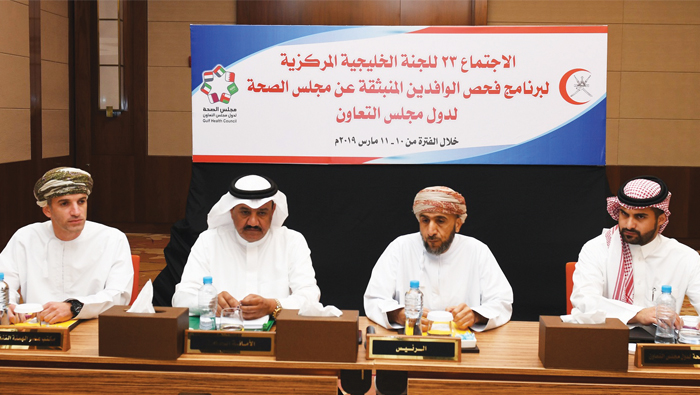
Muscat: The 23rd Meeting of the Gulf Central Committee for the Expatriates Health Check-up Programme of the GCC Health Council, hosted by the Sultanate, represented by the Ministry of Health (MOH) concluded yesterday at the Crown Plaza Hotel.
During the meeting, the progress of the Expatriates Health Check-up Programme and its main results, which aims to maintain the health security for the gulf community, were discussed.
Dr. Al Abri praised the main role of the Expatriates Health Check-up Programme through ensuring the medical fitness of the expatriates and that they are not suffering from any diseases that may pose a risk to the GCC members, in addition to reducing the diseases that may form an economic burden to those who are coming to the GCC states.
Sulaiman Al Dakheel, Director General of GCC Health Council highlighted the challenges facing the Expatriates Health Check-up Programme and stressed the concern of the General Secretariat of Cooperation Council on the success of the Programme during the next important phase.
Dr. Mohammed Al Yazidi, from the Directorate General of Diseases Surveillance & Control, pointed out that the meeting addressed a number of relevant topics including reviewing the centres in the countries covered by the Programme, discussing the amendments and additions of the regulations, follow-up the implementation of recommendations of the 22nd meeting, as well as discussing the hygiene requirements for vaccinations.
The meeting also touched upon the statistics of expatriates examined in the programme, reviewed the most important discovered diseases and categories and the possibility to extend the program to other countries.
It is worth mentioning that the Expatriates Health Check-up Programme is one of the most important preventive programmes in the public health, as it authorises the examination centres in the labour-exporting countries, which in turn perform the medical check-ups scheduled in the Health Council Examination lists before issuing visas in order to limit the entry of inappropriate health cases to the GCC countries. The results of the Programme indicate that the percentage of inappropriate cases, which entered the GCC countries before the adoption of the Programme ranged between 17% to 20% and gradually decreased approximately to 0.5% after applying the electronic connectivity system.